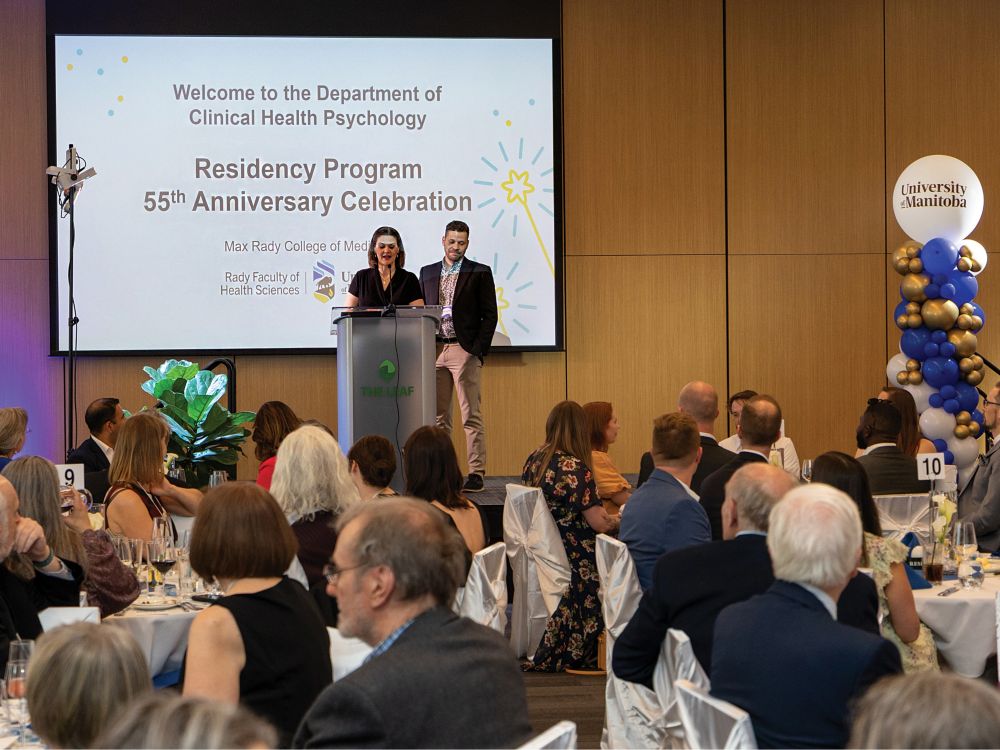When the UM clinical health psychology residency program was launched during the 1969-70 academic year, there were just two residents and one training site.
Fifty-five years later, the Max Rady College of Medicine psychology residency program is one of Canada’s largest, with 13 residents, 30 training sites, and funding to continue expanding to meet Manitoba’s need for professional psychologists.

“The program has been highly impactful, training close to 400 psychologists,” said Patricia Furer [BA/85, MA/87, PhD/96], residency program director and associate professor.
Clinical health psychology is both a UM department and a provincial clinical service under Shared Health. The one-year residency is the culmination of a decade of schooling to become a clinical psychologist, providing the final training to complete a clinical doctoral degree.
The residency program was to celebrate its 50-year milestone in 2020, but COVID-19 intervened. So during the 2024-25 academic year, events were held to mark the 55th anniversary.
In May, residency alumna Dr. Lisa Feldman Barrett, a world-renowned neuroscientist, gave an invited lecture. A gala anniversary dinner at The Leaf at Assiniboine Park followed, with close to 200 alumni, faculty, current residents and guests in attendance.
Lesley Graff [PhD/93], professor and head of clinical health psychology, noted the striking number of national leaders who have trained at UM.
“Some alumni have served as vice-presidents of hospitals. Others have been president of the Canadian Psychological Association, and many are well known internationally for their clinical research.”
One historical highlight Graff recalled was the establishment in the 1990s of the Rural and Northern Program within the residency.
The program, she said, challenged the status quo of fly-in service, instead placing psychologists in rural and northern communities to live and work, along with residents doing clinical rotations.
“It was a groundbreaking model at the time,” she said. The program has since trained 66 residents, many of whom have been recruited to work rurally.
In 1995, the department of clinical health psychology was established. “It was a significant milestone that we became a full department of the medical school,” Graff said.
Elsewhere in Canada, she said, psychology residencies are often run by hospitals or other clinical facilities. “Being based in a medical school provides advantages such as interprofessional training, multiple sites and salary parity with medical residents.”
In 2019, Graff became the first provincial lead for clinical health psychology. She has worked closely with the province and health leadership to increase the residency program’s training seats and clinical positions in the health system.
Today, the program offers training streams in child psychology, adult psychology, medical psychology, neuropsychology and rural practice.
“Our breadth and range of training opportunities, and being positioned within a medical school, set us apart from other Canadian psychology residencies,” Furer said.
Residents are also exposed to innovative clinical research conducted by UM faculty members. The department is close to reaching its fundraising goal of $1.5 million to establish an endowed professorship in clinical health psychology and plans to launch a campaign to establish an endowed professorship in child psychology.
The program is committed to strengthening diversity in professional psychology, Furer said.
“We look forward to continuing to be on the leading edge of new areas of practice for psychologists and innovations in clinical care.”
BY MATTHEW KRUCHAK
